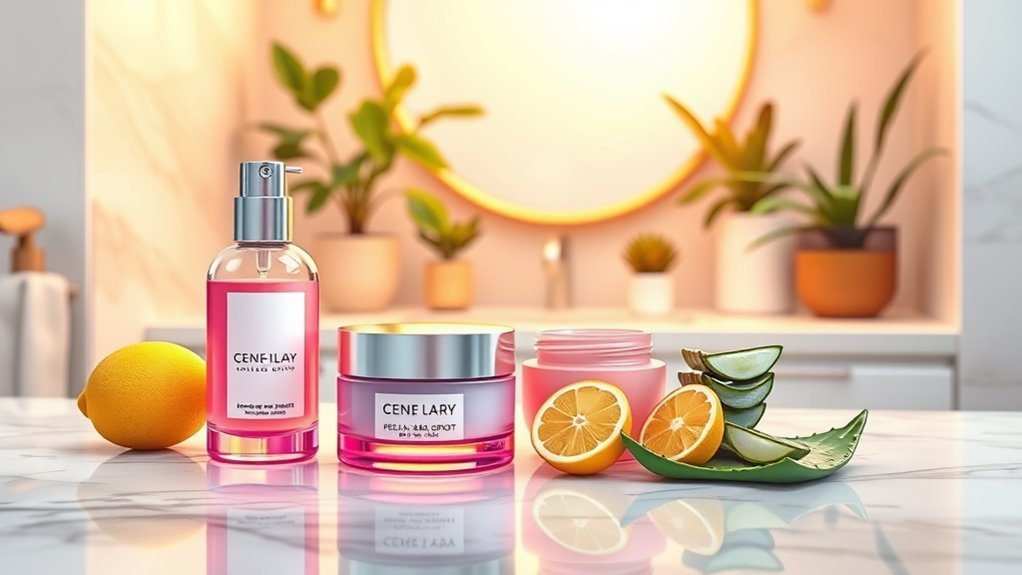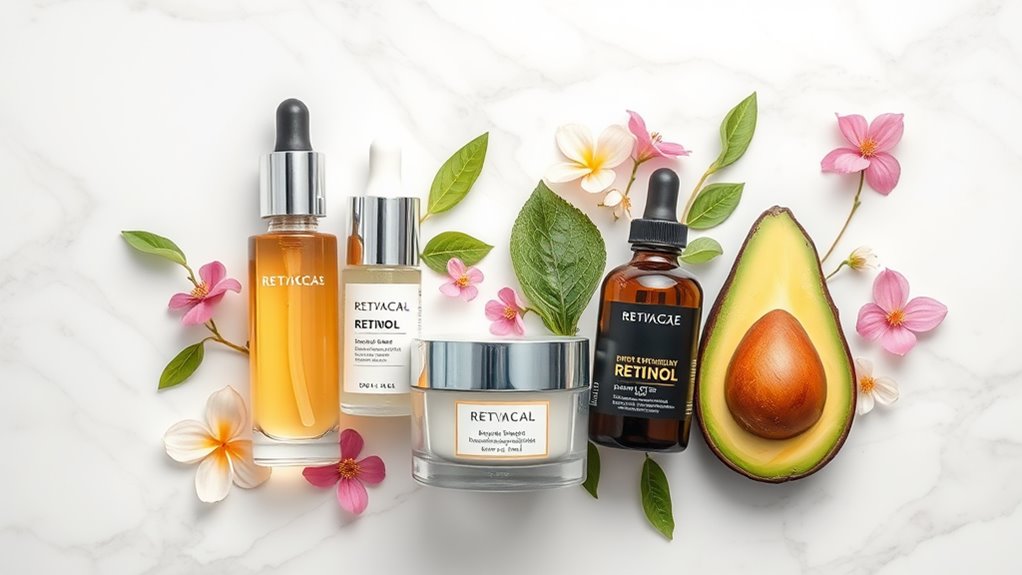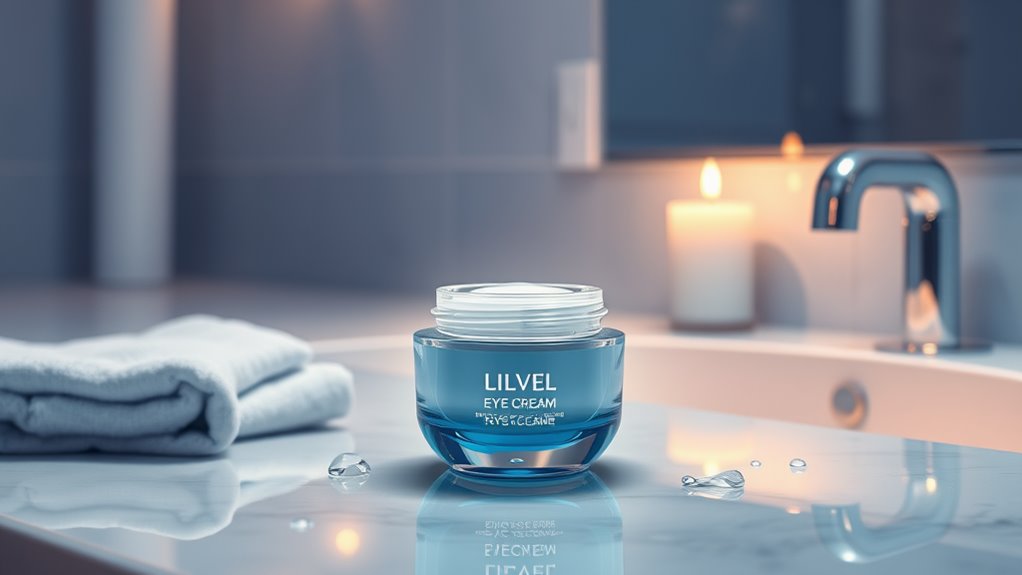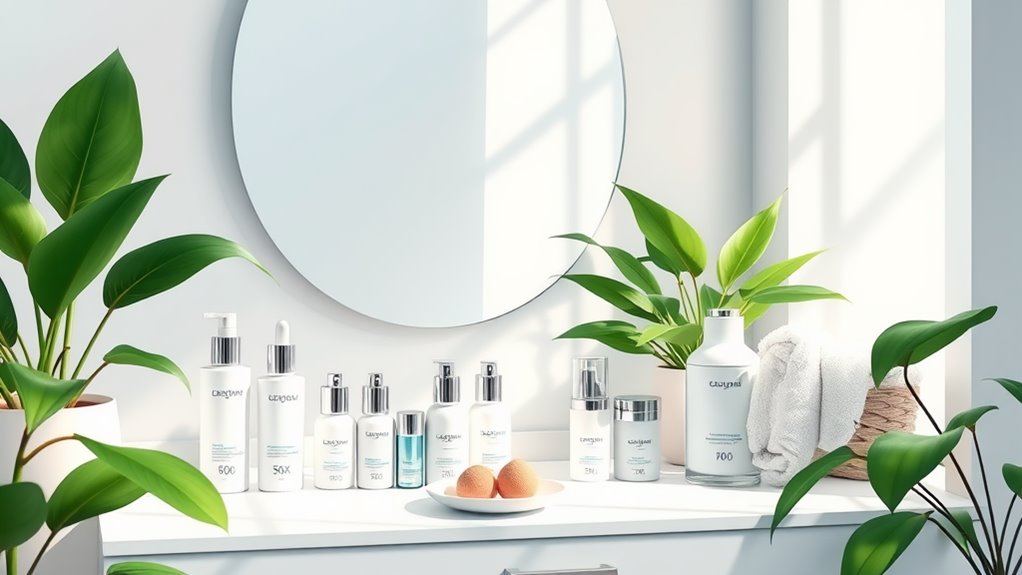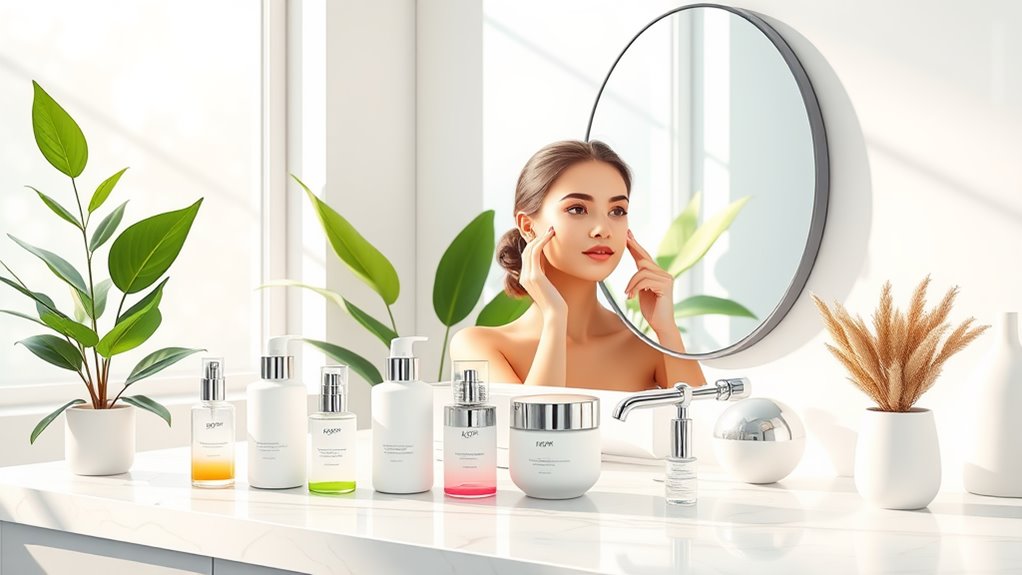The Surprising Routine That Helps Fade Dark Spots
If you’re struggling with dark spots, you’re not alone. Many people share this concern, and the good news is that a simple routine can make a significant difference. By focusing on consistency and incorporating specific treatments, you can gradually lighten those spots. But what exactly should you include in your regimen? Let’s explore the essential steps you can take for healthier, more radiant skin.
Key Takeaways
- Incorporate a vitamin C serum in your morning routine to brighten skin and inhibit melanin production.
- Use retinol at night to promote skin renewal and improve texture, aiding in spot fading.
- Exfoliate 2-3 times weekly with AHAs or BHAs to enhance cell turnover and product absorption.
- Apply broad-spectrum sunscreen daily to protect against UV rays and prevent new dark spots from forming.
- Stay hydrated and maintain a balanced diet rich in antioxidants to support overall skin health and repair.
Understanding Dark Spots and Hyperpigmentation
Dark spots, often a result of hyperpigmentation, can be frustrating to deal with. Understanding the underlying causes is essential for effective treatment. These spots usually develop due to excessive melanin production, triggered by factors like sun exposure, hormonal changes, or inflammation.
You might notice them appearing after acne or as age spots, but they don’t have to be permanent.
To tackle dark spots, start by identifying your triggers. A consistent skincare routine that includes targeted ingredients can greatly improve your skin’s appearance. Incorporating scientifically-proven methods can enhance the effectiveness of your treatment.
Focus on products that promote cell turnover, like exfoliants or brightening agents. With dedication and the right approach, you can diminish those dark spots and achieve a more even skin tone.
Master the basics, and watch your confidence grow.
The Power of Antioxidants in Your Skincare
In your quest to fade dark spots, incorporating antioxidants into your skincare routine can make a significant difference.
These powerful compounds combat free radicals, reduce inflammation, and promote a more even skin tone. Here’s how you can harness their benefits:
-
Vitamin C: This potent antioxidant brightens your skin, boosts collagen production, and helps lighten dark spots.
-
Vitamin E: Known for its moisturizing properties, Vitamin E protects your skin from oxidative stress and enhances overall skin health.
-
Green Tea Extract: Rich in polyphenols, it soothes irritation and helps diminish pigmentation while offering anti-aging benefits. Additionally, using specific ingredients rich in antioxidants can amplify the effects of your routine.
Incorporating Exfoliation Into Your Routine
To effectively fade dark spots, you can’t overlook the importance of exfoliation in your skincare routine. Exfoliation removes dead skin cells, promoting cell turnover and revealing fresher skin underneath.
You should aim to exfoliate 2-3 times a week, depending on your skin type. For a more gentle approach, consider chemical exfoliants, like AHAs or BHAs, which dissolve dead skin without harsh scrubbing.
If you prefer physical exfoliants, choose those with fine granules to avoid irritation. Always listen to your skin; if it feels sensitive, scale back.
Proper exfoliation not only brightens your complexion but also maximizes the absorption of your other skincare products, enhancing their effectiveness. Additionally, regular exfoliation is essential for preventing premature aging, as it helps maintain a youthful glow.
Incorporate this crucial step to achieve that radiant, even-toned skin you’re aiming for.
The Role of Sun Protection in Fading Dark Spots
To fade dark spots effectively, daily sunscreen is essential.
UV rays can worsen pigmentation, making your efforts less effective if you don’t protect your skin.
Choosing broad-spectrum protection guarantees you guard against both UVA and UVB rays, helping you achieve a clearer complexion.
Importance of Daily Sunscreen
While you may focus on fading dark spots through various treatments, daily sunscreen is essential in this process. Protecting your skin from sun exposure not only prevents new dark spots from forming but also supports the effects of your fading treatments.
Here are three key reasons to make sunscreen a daily ritual:
-
Prevents Hyperpigmentation: Sunscreen shields your skin from harmful UV rays, which can worsen existing dark spots.
-
Enhances Treatment Efficacy: When combined with fading products, sunscreen helps maintain their effectiveness by preventing sun-induced damage.
-
Promotes Even Skin Tone: Consistent sun protection aids in achieving a balanced complexion, allowing your efforts to shine through.
Incorporating daily sunscreen into your routine is vital for achieving the clear, radiant skin you desire.
UV Rays and Dark Spots
Even if you’re diligent about fading dark spots, exposure to UV rays can quickly undermine your efforts. UV radiation stimulates melanin production, which worsens pigmentation issues and darkens existing spots.
To truly master your skincare regimen, you need to prioritize sun protection. Wearing sunscreen daily isn’t just an option; it’s a necessity. Even brief sun exposure can trigger pigmentation, making it vital to shield your skin.
Incorporating protective clothing and seeking shade during peak sun hours enhances your defense against harmful rays. Remember, consistent protection allows your fading treatments to work effectively, ensuring your skin stays clear and radiant.
Don’t let UV rays sabotage your hard work—commit to a robust sun protection strategy for lasting results.
Choosing Broad-Spectrum Protection
Choosing broad-spectrum protection is essential for effectively fading dark spots and ensuring your skin remains healthy. By blocking both UVA and UVB rays, you reduce the risk of further pigmentation while allowing your treatment products to work more effectively.
Here are three key points to take into account:
-
SPF 30 or Higher: Always select a sunscreen with at least SPF 30 for ideal protection against harmful rays.
-
Daily Application: Apply sunscreen each morning, even on cloudy days, as UV rays can penetrate through clouds.
-
Reapplication: Reapply every two hours, or immediately after swimming or sweating, to maintain consistent protection.
Integrating broad-spectrum sunscreen into your routine not only helps fade existing dark spots but also prevents new ones from forming.
Targeted Treatments: Ingredients to Look For
When tackling dark spots, knowing the right active ingredients can make all the difference.
Look for powerful compounds like vitamin C, retinol, and niacinamide that specifically target pigmentation.
Plus, applying these treatments correctly enhances their effectiveness, so let’s explore some tips and techniques to get the best results.
Key Active Ingredients
To effectively tackle dark spots, you’ll want to focus on key active ingredients known for their brightening and exfoliating properties. Incorporating these into your skincare routine can greatly enhance your results:
-
Vitamin C: This potent antioxidant brightens skin and diminishes pigmentation by inhibiting melanin production.
-
Alpha Hydroxy Acids (AHAs): Ingredients like glycolic acid gently exfoliate the skin’s surface, promoting cell turnover and revealing a brighter complexion.
-
Niacinamide: This multi-tasking ingredient not only lightens dark spots but also improves skin texture and reduces inflammation.
Application Tips and Techniques
Incorporating the right active ingredients into your routine is just the beginning; how you apply them can make a significant difference in their effectiveness.
Start with clean, dry skin to guarantee ideal absorption. Use a gentle tapping motion to apply targeted treatments, allowing the product to penetrate deeply. Focus on affected areas, but don’t forget to blend slightly beyond the edges to avoid harsh lines.
Layering is essential—apply lighter serums first, followed by thicker creams. Always follow with sunscreen during the day, as some ingredients can increase sensitivity to sunlight.
Finally, consistency is key; commit to your routine and be patient, as fading dark spots takes time and dedication for the best results.
Lifestyle Changes That Support Skin Health
While you might focus on topical treatments for fading dark spots, lifestyle changes can greatly enhance your skin’s health and appearance.
By integrating these habits into your daily routine, you’ll support your skin’s rejuvenation process:
-
Stay Hydrated: Drinking adequate water flushes toxins and keeps your skin plump.
-
Eat a Balanced Diet****: Incorporate antioxidants, vitamins, and healthy fats from fruits, vegetables, and nuts to nourish your skin from within.
-
Prioritize Sleep: Aim for 7-9 hours of quality sleep each night to allow your skin to repair itself naturally.
Consistency Is Key: Building Your Daily Routine
Establishing a consistent daily routine is crucial for fading dark spots and promoting overall skin health. By committing to a structured regimen, you can effectively target and reduce pigmentation issues. Here’s a simple daily breakdown to guide you:
| Morning Routine | Evening Routine | Weekly Treatment |
|---|---|---|
| Cleanse your face | Cleanse your face | Exfoliate (2x week) |
| Apply vitamin C serum | Apply retinol | Face mask (1x week) |
| Moisturize | Moisturize | Spot treatment |
| Sunscreen (SPF 30+) | Hydrating serum | |
| Drink water | Sleep well (7-8 hours) |
Following this table, you’ll create a powerful routine that promotes skin clarity and well-being. Consistency and patience are your allies on this journey.
Frequently Asked Questions
Can Diet Impact the Appearance of Dark Spots?
Yes, your diet can greatly impact dark spots. Consuming antioxidants, vitamins, and healthy fats helps promote skin health. You’ll notice improvements by incorporating colorful fruits, vegetables, and hydration into your daily meals.
How Long Does It Take for Dark Spots to Fade?
Dark spots typically take several weeks to months to fade, depending on factors like your skin type and treatment method. Consistency in your skincare routine and sun protection can accelerate this process considerably.
Are Dark Spots Genetic or Environmental?
Dark spots can be both genetic and environmental. If your family has a history of them, you might be more prone. Additionally, sun exposure and lifestyle choices can greatly influence their development and persistence.
Is Makeup Safe to Use While Treating Dark Spots?
Yes, makeup’s generally safe during dark spot treatment, but opt for non-comedogenic, gentle products. Keep your skin clean, and guarantee treatments absorb properly to maximize their effects while still enjoying your makeup routine.
Can Stress Influence the Development of Dark Spots?
Absolutely, stress can influence the development of dark spots. It triggers hormonal changes that may increase melanin production. Managing stress effectively can help maintain your skin’s health and reduce the risk of developing these spots.
Conclusion
By following this surprising routine, you can effectively fade dark spots and achieve a more radiant complexion. Remember to cleanse, apply vitamin C in the morning, and retinol at night, while exfoliating regularly. Don’t forget the importance of broad-spectrum sunscreen to shield your skin from new spots. With consistency and the right targeted treatments, you’ll be well on your way to healthier, even-toned skin. Start today and embrace the journey to a brighter you!

